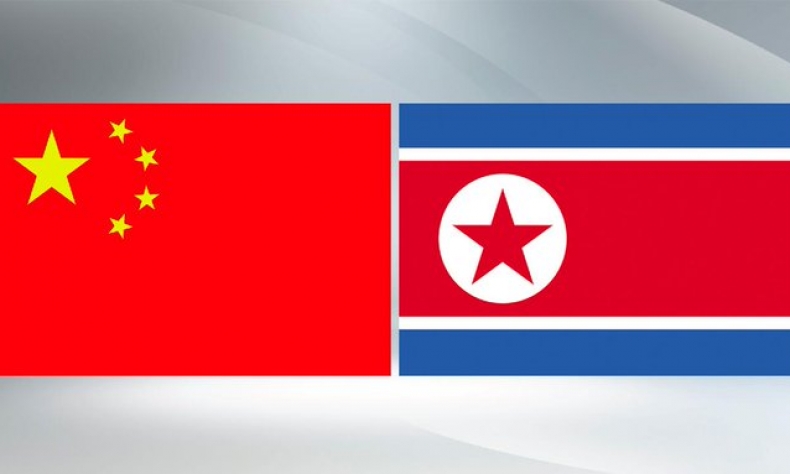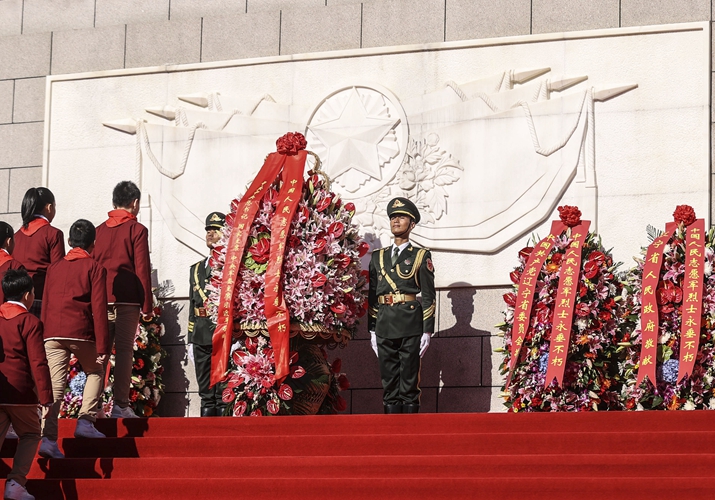Dispelling Myths About China-DPRK Relationship

China has actively pushed for denuclearization on the peninsula; it does, however, remain firmly against any injustice under hegemony.
July 11 this year marked the 60th anniversary of the signing of the Treaty of Friendship, Cooperation and Mutual Assistance Between China and the Democratic People’s Republic of Korea (DPRK). Leaders of the two countries exchanged messages of congratulations for this event.
In his message, Chinese President Xi Jinping spoke highly of the leaders of the elder generation of China and the DPRK for making the far-sighted strategic decision to sign the treaty, which laid important political and legal foundations for consolidating the friendship the two peoples had forged with blood and promoting friendly cooperation in the future. He pointed out that over the past 60 years, China and the DPRK, firmly supporting each other and striving hand in hand in the spirit of the treaty, have strengthened the traditional brotherly friendship, advanced the development of their respective socialist causes, and safeguarded regional and global peace and stability.
Kim Jong Un, Chairman of the State Affairs Commission of the DPRK, said in his message that mutual support and help characterize the bilateral relationship following the signing of the treaty. In recent years, in the face of a complex and changing international landscape, the comradely trust and friendship between the DPRK and China have kept growing deeper and bilateral relations have advanced, he added.
The China-DPRK solidarity has made great contributions to the post-war peace and stability in East Asia. The leaders both expressed their confidence that the friendly cooperation between the two countries will continue to progress.
A new type of relationship
The Chinese and Korean peoples have maintained close relationship since ancient times and always offered assistance to each other when needed. The People’s Republic of China and the DPRK are two modern countries established after World War II (WWII). They chose similar development paths to shake off the shackles of the old era, but both countries had to confront blockades by imperialist forces in their early years.
The 1950-53 Korean War was initially a civil war as both the DPRK and the Republic of Korea (ROK) attempted to reunify the Korean Peninsula. In fact, the ROK has not signed the armistice because it was unwilling to give up its desire for reunification by force. Some imperialist countries later intervened in the conflict, trying to extend their sphere of influence up to the Yalu River, the border between China and the DPRK, and even dropping bombs on Chinese territory. This forced China to join the war. It was in the joint struggle against imperialist aggression that China and the DPRK forged great friendship.
However, this cooperation is not the only thing that binds the two countries together. The continuous and steady development of the China-DPRK relationship in a complicated and difficult international environment after WWII, especially in the post-Cold War period, should be primarily credited to their new strategies for handling international relations that root in their cultural traditions and develop in a socialist context.
Western international relations have often been expansionist and imperialist in style. It is, in this context, that the modern-time geopolitical doctrine of Western countries was formed, regarding ruling the world—or global hegemony—as the ultimate expression of empire. The Korean Peninsula issue fundamentally lies in the fact that “maritime empires” from Japan to the U.S. have all tried to control the area as a way to dominate East Asia.
Western countries have also used the theory to interpret the relationship between China and the Korean Peninsula. But in fact, the Chinese nation has never applied force to conquer other countries. The idea of harmony for all nations can be found in the Book of Documents, one of the five ancient Chinese literature classics. The modern-time relationship between China and the Korean Peninsula before the Japanese occupation in the first half of the 20th century has been described by Western countries as a tributary one. However, the government of the Qing Dynasty (1644-1911) always treated Korea as a sovereign state in dealing with Korean Peninsula-related issues.
The China-proposed Five Principles of Peaceful Coexistence, namely mutual respect for sovereignty and territorial integrity, mutual non-aggression, non-interference in each other’s internal affairs, equality and mutual benefit, and peaceful coexistence, carry forward the idea of harmony for all nations. They are the norms for China to manage its relations with countries of different cultures and ideologies.
China upholds the principle that all countries, regardless of their size, are equal and should not interfere in the internal affairs of other countries. It greatly outnumbers the DPRK in population and territorial size. But China treats the DPRK as an equal and does not interfere in the latter’s internal affairs.
The non-alignment policy is an essential part of China’s diplomatic strategy. But given the historical context in which it was signed, the China-DPRK Treaty of Friendship, Cooperation and Mutual Assistance includes an obligation of rendering military assistance if one side is subject to foreign aggression. Nevertheless, it does not undermine the equal footing of both countries.
In contrast, although some Western countries espouse “all men are created equal” and advocate for an “alliance of values,” their alliance is built on the political system of empire. If not for controlling its European allies, why else would the U.S. continue to spy on those countries?

Global significance
The traditional friendship between China and the DPRK has always been interpreted from a geopolitical perspective in Western opinion, and some speak critically of this relationship. However, Western geopolitical theory is the product of imperialist thinking and serves to justify aggressive and expansionist policies. The shifting international landscape in the post-Cold War period has proved that it does nothing but ruin the possibility of peaceful coexistence of countries. The hegemonic stability theory, prevailing in the U.S. after the Cold War, asserts that the international system is more likely to remain stable when a single nation-state is the dominant world power or hegemon.
On the contrary, China upholds the principles of equality, mutual benefit and cooperation in international exchanges. It is committed to building a community with a shared future for humanity. The China-DPRK relationship is an example of this community.
Considering the trend of reconciliation on the Korean Peninsula after the end of the Cold War, China developed relations with the ROK to facilitate the peace process. It has always supported proposals for independent and peaceful reunification of the peninsula, but opposes unilateral attempts by banking on external forces that may endanger regional peace. China has actively pushed for denuclearization on the peninsula; it does, however, remain firmly against any injustice under hegemony.
During former U.S. President Donald Trump’s administration, there was hope that the denuclearization process might advance. But after the DPRK started demolishing some of its nuclear facilities, the U.S. reneged on its commitment to reduce sanctions and imposed further demands, sinking the nuclear deal. China has called on the U.S. to take practical steps to resolve the issue of denuclearization on the peninsula by addressing the DPRK’s concerns on development and security.
The author is an op-ed contributor to Beijing Review and an expert on international studies.
 Facebook
Facebook
 Twitter
Twitter
 Linkedin
Linkedin
 Google +
Google +










